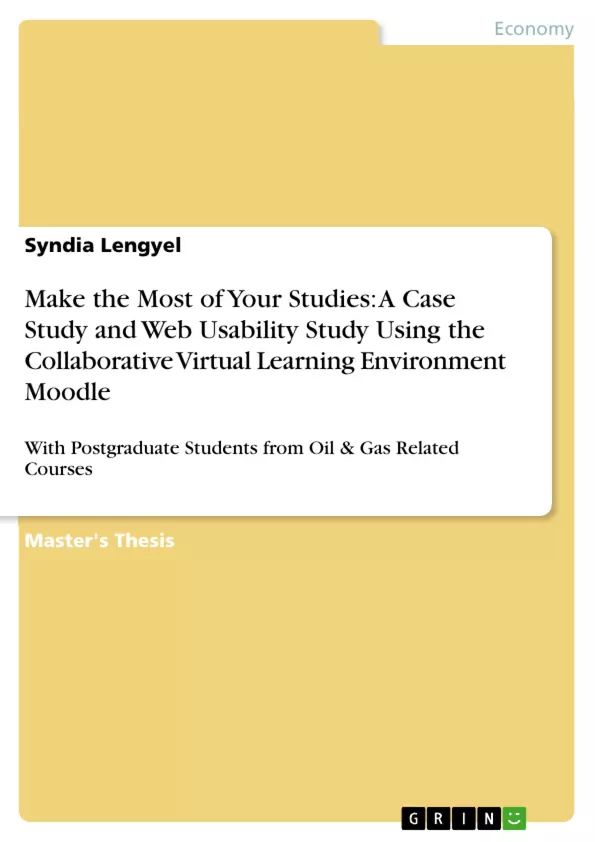The overall aim of this study was to draw-up recommendations on how the collaborative virtual learning environment ‘Moodle’ could be integrated and embedded more effectively in the studies of postgraduate Oil & Gas related courses at The Robert Gordon University. A single intrinsic case study approach was chosen. Data was collected using usability testing and observation, interviews, questionnaires, Freedom of Information Requests and additional data sources such as relevant conferences and secondary research for literature review.
Background information was provided by introducing the University’s infrastructure, relevant student demographics related to the investigated module ‘Business Essentials’ and analysing the Moodle implementation. By focussing on students’ and academics’ information needs, an evaluation of current processes and setups within the University’s network and Moodle was undertaken. Navigation and consistency as core usability issues were investigated and examples of a potential re-design provided. The e-learning aspect was evaluated by investigating interactivity in ‘Business Essentials’. By adapting existing learning content, a demonstration of using Moodle feature in the investigated module was given. Additionally, challenges and opportunities outside the Moodle environment were identified. Within the analysis recommendations were made as appropriate in the relevant sections.
Key findings of this study were that usability issues need to be addressed in order to provide meaningful information to individual user groups. Furthermore, existing Moodle features need to support interactive learning and address students’ learning style. Additionally, staff training regarding Moodle features, e-learning facilitation and search skills needs to be addressed. Finally, it was found that the University would benefit from establishing a Knowledge Management strategy. A summary of recommendation was detailed in a separate chapter.
Table of Contents
- Abstract
- Acknowledgements
- Editorial Note
- Chapter 1: Introduction
- 1.1 Introduction
- 1.2 Research Aims and Objectives
- 1.3 Research Questions
- 1.4 The Scope of This Study
- 1.5 The Limitations of This Study
- 1.6 Ethical Considerations
- 1.7 Structure of this Dissertation
- Chapter 2: Literature Review
- 2.1 Virtual Learning Environments
- 2.1.1 History and Development
- 2.1.2 Key Features and Functionality
- 2.1.3 Benefits and Drawbacks
- 2.2 Web Usability
- 2.2.1 Usability Principles
- 2.2.2 Usability Testing and Evaluation
- 2.3 Case Studies in VLE Implementation
- 2.4 The Robert Gordon University
- 2.4.1 The University's Vision and Mission
- 2.4.2 The Information Management Department
- 2.4.3 Moodle and Its Role in Teaching and Learning
- 2.5 The Oil & Gas Industry and its Relevance to This Study
- Chapter 3: Methodology
- 3.1 The Research Design
- 3.1.1 Case Study Approach
- 3.1.2 Data Collection and Analysis
- 3.2 The Case Study Context
- 3.2.1 The University's Infrastructure and Network
- 3.2.2 The 'Business Essentials' Module
- 3.2.3 Student Demographics
- 3.3 The Data Collection Process
- 3.3.1 Usability Testing and Observation
- 3.3.2 Interviews
- 3.3.3 Questionnaires
- 3.3.4 Freedom of Information Requests
- 3.3.5 Secondary Research and Literature Review
- 3.4 Data Analysis and Interpretation
- 3.5 Ethical Considerations
- Chapter 4: Findings
- 4.1 Moodle Implementation and Its Effectiveness
- 4.1.1 Usability Issues and Navigation Challenges
- 4.1.2 Consistency and Coherence in Moodle Design
- 4.1.3 The Use of Moodle Features in 'Business Essentials'
- 4.2 Students' Perceptions of Moodle
- 4.2.1 Information Needs and Expectations
- 4.2.2 Attitudes towards and Usage of Moodle
- 4.3 Academics' Perspectives on Moodle
- 4.3.1 Teaching Styles and Pedagogical Approaches
- 4.3.2 Integration of Moodle into Curriculum Design
- Chapter 5: Discussion
- 5.1 Key Findings and Insights
- 5.2 Implications for Practice and Policy
- 5.3 Further Research Directions
Frequently Asked Questions
What was the main goal of the Moodle study at RGU?
The goal was to provide recommendations on how to integrate Moodle more effectively into postgraduate Oil & Gas courses at The Robert Gordon University.
What were the key findings regarding usability?
The study found that navigation and consistency are core usability issues that need to be addressed to provide meaningful information to users.
How was the data collected for this case study?
Data was collected through usability testing, observation, interviews, questionnaires, and Freedom of Information requests.
What recommendations were made for staff?
Recommendations included training in e-learning facilitation, Moodle features, and better search skills.
What is the "Business Essentials" module?
It is the specific module investigated in the study to demonstrate how Moodle features could be better adapted for interactive learning.
What long-term strategy did the study suggest for the University?
The study suggested that the University would benefit from establishing a comprehensive Knowledge Management strategy.
- Citation du texte
- Syndia Lengyel (Auteur), 2009, Make the Most of Your Studies: A Case Study and Web Usability Study Using the Collaborative Virtual Learning Environment Moodle, Munich, GRIN Verlag, https://www.grin.com/document/152345



